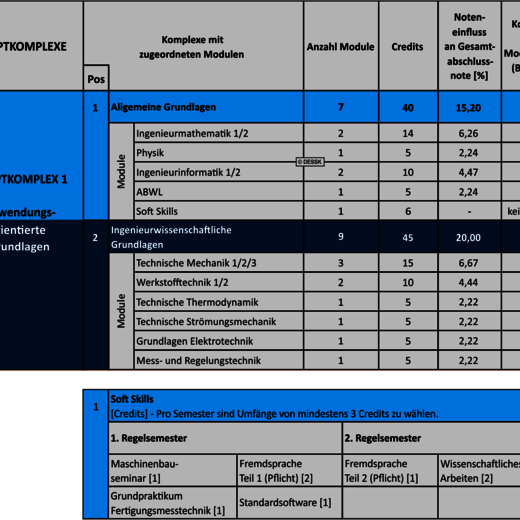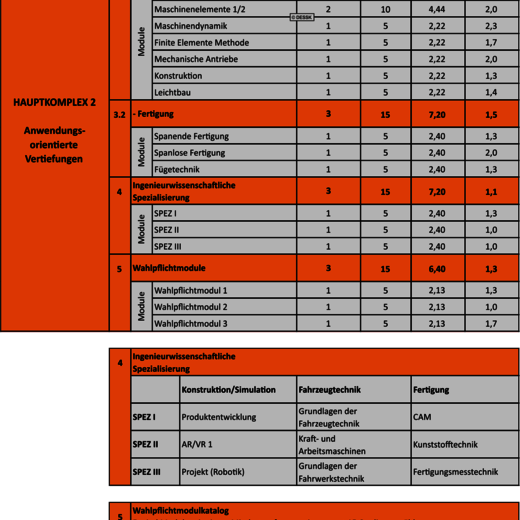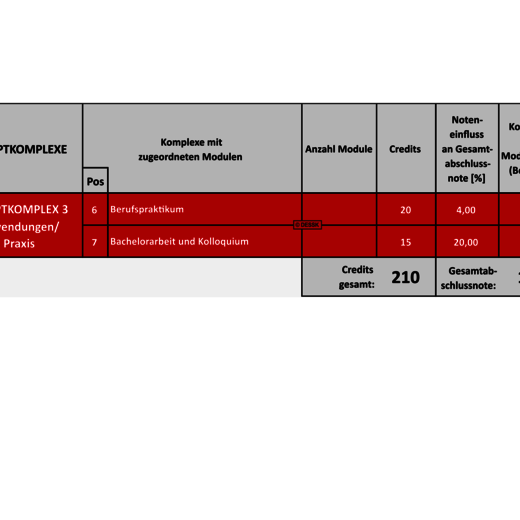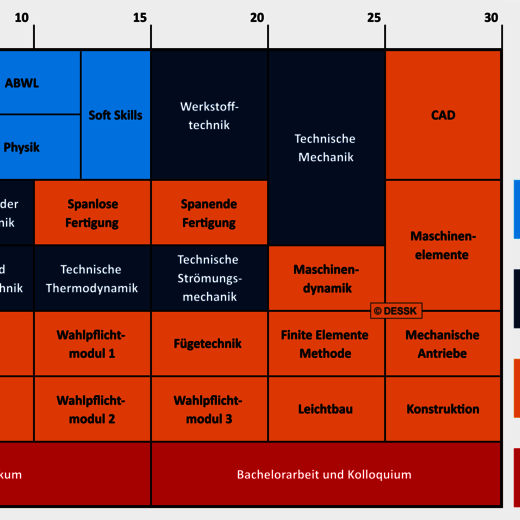Information about the degree program
Our guiding principle: The CAx process chain
In the future, increased competitive pressure, tight budgets, small time frames as well as reproducible quality requirements in corporate development, testing, manufacturing and the inspection of new products will increasingly demand the use of digital tools including their linking to a self-contained CAx process chain.
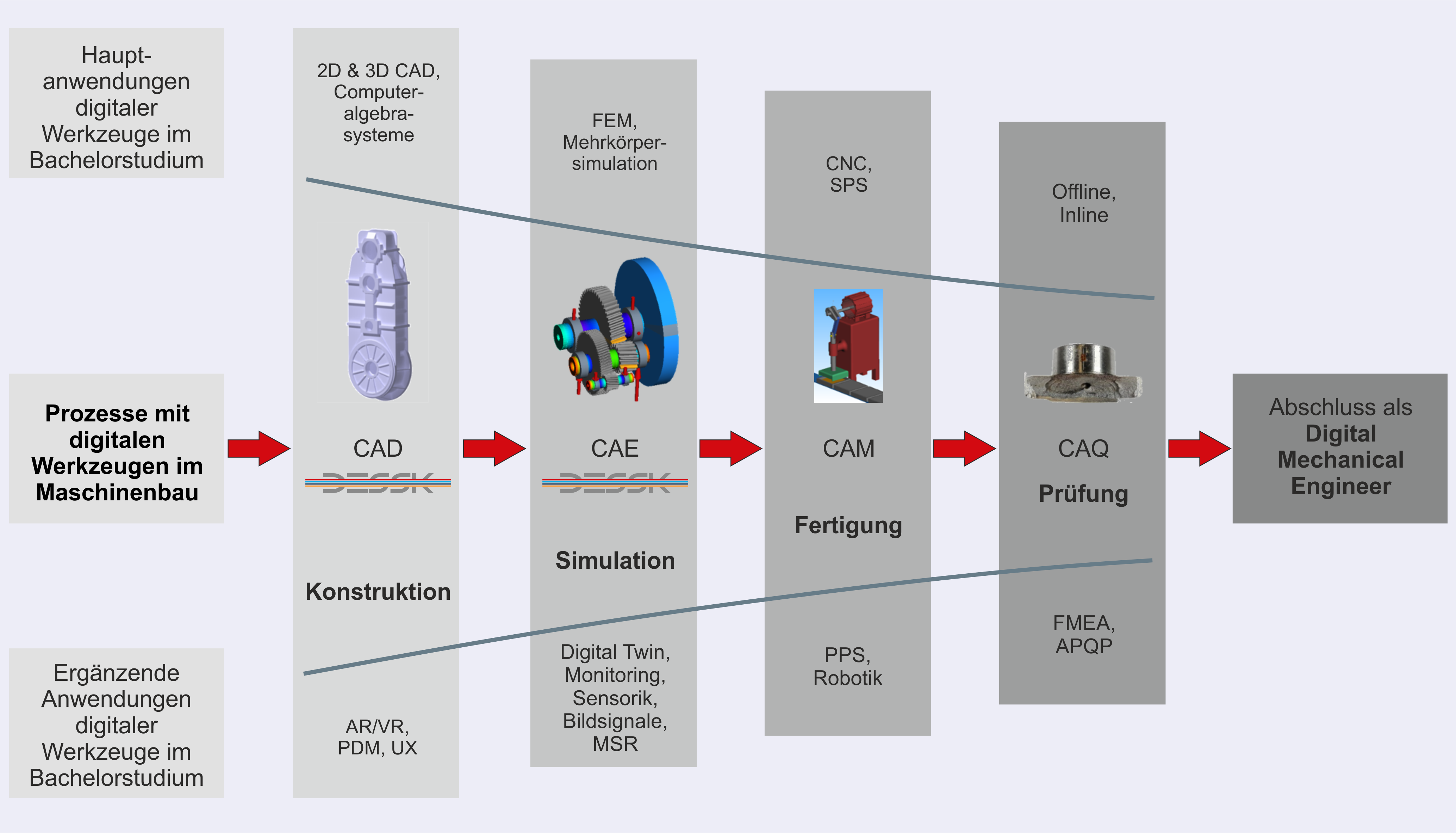
The degree program is oriented to the CAx process chain.
With us, you will study Digital Mechanical Engineering in a way that is fit for the future. The best prospects for your future!
Showroom of the degree program: Video insights (in German)
Using digital tools to become a digital mechanical engineer
-
CAx briefly explained
What does CAx stand for?
CAx stands for computer aided x. The x can be used as placeholder, for example, for design (construction), engineering (calculation/simulation), manufacturing and quality assurance. These and other aspects are defined as processes and describe in their entirety the complete range of computer-aided planning, development, design, manufacturing and quality assurance of physical products.
-
Importance of the CAx for your degree program
Our program is based on the following central question:
How do you get from an idea to creating a product?
Depending on the application, products differ in their structure and properties – be they eye glasses or aircraft turbines. This results in different product development strategies which can each require its own focus, for example, on design or manufacturing or materials technology or quality assurance. However, individual aspects must always be considered in their complex interaction with each other, which means considering the process holistically as well as in terms of resolving the many frequently conflicting goals. That is why there is not just one correct solution! Therefore, our modules are coordinated in the context of the CAx process chain in terms of content and chronology, whereby the content is application oriented. In addition, we support you on your way to becoming a digital mechanical engineer in the efficient use of digital tools.
-
Our degree program sequence
With our balanced mix of the core complexes of engineering basics and specializations as well as applications with direct practical relevance, your studies will remain interesting and exciting.
What are complexes and modules?
Our 3 core complexes are divided into subordinate complexes, which in turn are composed of several modules. You already know subjects from school or your vocational training; however, at our university, subjects are called modules.
Why structuring by complexes?
It is important to us that you know at all times what the individual modules represent in your program. The modules are logically arranged and coordinated in the degree program. For clarity, we have therefore classified the modules according to basics, specializations and practical applications, and have bundled them into corresponding complexes.
Our degree program is divided into core complexes (from 2020)
-
Core complex 1: Application-oriented basics
The core complex 1 is divided into the complexes “Allgemeine Grundlagen (1)” and “Ingenieurwissenschaftliche Grundlagen (2)”. The “Allgemeine Grundlagen (1)” includes the S(cience), E(ngineering) and M(ath) modules from STEM as well as the soft skills package. The “Ingenieurwissenschaftliche Grundlagen (2)” includes the T(echnology) modules from STEM. Both foundational complexes are spread over the first 4 semesters. Our package of soft skills includes several elective modules and is offered in the first two semesters.
-
Core complex 2: Application-oriented specializatio
The core complex is divided into the complexes “Ingenieurwissenschaftliche Vertiefungen (3)”, “Ingenieurwissenschaftliche Spezialisierung (4)” and elective modules (5). The complex “Ingenieurwissenschaftliche Vertiefungen (3)” includes the subcomplexes “Konstruktion/Simulation (3.1)” and “Fertigung (3.2)”, which significantly shape the CAX profile of our degree program. The program is geared towards the needs of young engineering specialists in the mechanical engineering companies that are important for Saxony-Anhalt. In the complex “Ingenieurwissenschaftliche Spezialisierung (4)”, the following three specializations are offered: Construction/simulation, automotive engineering and manufacturing engineering. In the 5th and 6th semesters, we offer specializations as well as subject-specific and interdisciplinary elective modules.
-
Core complex 3: Applications in practice
At the end of the bachelor's degree program, students apply their acquired basics and in-depth knowledge practically during the internship (6) and the bachelor’s thesis (7). Depending on personal interests, students can choose their focus and decide whether they wish to work on the topic at the university or in a company.
- Complex and module plan
-
Credits & workload
What are credits?
The European Credit Transfer and Accumulation System (ECTS) applies in the European Higher Education Area. Within the framework of the “Bologna Process”, the ECTS serves as the basis for aligning national higher education systems and study progressions for the bachelor's and master's phases. ECTS points are referred to as “credits” at our university and are synonymous with credit points. For a successfully completed module, we award the credits specified in the respective module description or curriculum. With the exception of a few modules, it is 5 credits per semester. 30 credits can be attained in each semester. In this 7-semester degree program, you will earn 210 credits including the internship and bachelor's thesis.
Your workload in the degree program
For each credit point, your workload (time required) for lectures, practical courses, lab/pool classes, and independent study amounts to approx. 25 hours. For 5 credits, you have to complete about 125 hours of workload per module and semester. For 30 credits per semester, your total workload will be approximately 750 hours.
We are looking forward to your application!
-
Requirements for the degree program
Acknowledged qualifications: general university entry qualification (Abitur), entry qualification for universities of applied sciences (Fachhochschulreife), master craftsman (Meister), technician
Aptitude test: no
Numerus clausus: no
Specialized internship: yes, see internship
Contact: maschinenbau@hs-anhalt.de
-
Application process
Application period: May 15 – September 15, 2020
Step by step:
1. Register in the application portal of the Student Service Center (SSC portal).
2. After logging in, select in Degree: “Bachelor”, Type of program: “Full-time program”, the desired degree program “Mechanical Engineering (B.Eng.)”, etc.3. Complete the online process, print, fill out and sign the generated document named “Application for Admission” (including applicant number).
4. Attach other documents to the application form (see checklist) and send via registered mail to Anhalt University of Applied Sciences.
5. Finally, send an informal email with your contact details (postal address and email address) to our department for quick registration of your application: maschinenbau@hs-anhalt.de
-
Checklist
- officially certified copy of the higher education entrance qualification, the Meister (master craftsman) certificate or the technician certificate
- CV with details of school/academic and professional career
- copy (both sides) of the identity card or passport (ID number can be blacked out)
- passport photo (35 x 45 mm, with applicant number on the back)
- deregistration and clearance certificate (Unbedenklichkeitsbescheinigung) (if you have been enrolled at a university before)
- vocational training contract/employment contract (only for cooperative/career-integrated degree programs)
